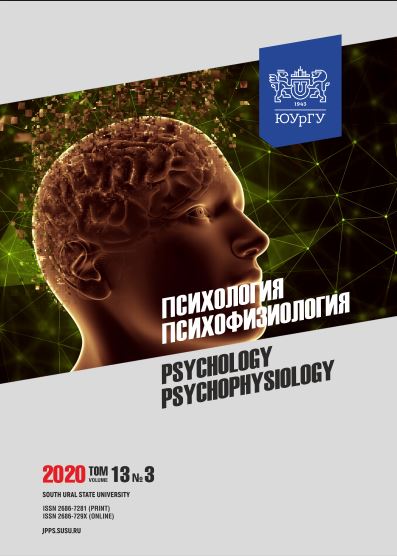FEATURES OF EMPLOYEES’ VALUES AND SOCIAL AND ROLE IDENTITY IN PERSONNEL TRAINING
Abstract
Background. Market uncertainty expands the capabilities of organizations and creates the need for the development of a training system that meets modern requirements. One of the requirements for personnel training is the need to develop readiness for choice in situations of uncertainty. According to researchers, the readiness for a situation of uncertainty is mediated by the social identity and values shared by the organization members. Features of social identity and values that form effective personnel strategies in a situation of uncertainty have been insufficiently studied. Aim. This study aims to determine the features of the social and role identity and values of employees in personnel training. Materials and methods. The sample of the study consisted of sales managers (80 people) aged from 23 to 45 years. Features of the social and role identity and values of managers were studied before and after the Motivation Skills program chosen for the experiment. Social and role identity was investigated using the ROSSTL method by V.G. Griazeva-Dobshinskaya; managers' values were studied using the eflective choice method by V.A. Petrovsky. The data obtained were subjected to factor analysis. Results. A change in the social and role identity and values of personnel in a learning situation has been revealed. After the experiment, managers identified as leaders began to choose work as subordinates and the values of “development” and “career” as a working requirement. Managers with vague identifications began to choose the activities relevant for the organization and such values as “career” and “money” as a working requirement. Managers without identification began to choose creative work and such values as “money” as a working requirement. Conclusion. It has been established that personnel training contributes to a change in the choice of professional roles and reflection regarding the values chosen by personnel.
Downloads
References
2. Badue A. Filosofiya i sobytie [Philosophy and Event]. Moscow, IOI, 2013, 192 p. (In Russ).
3. Bazarov T.Yu. Upravlenie personalom razvivayushcheisya organizatsii [Personnel Management developing organization]. Moscow, IPK of civil service, 1996. 152 p. (in Russ.).
4. Belinskaya E.P. Chelovek v izmenyayushchemsya mire – sotsialno-psikhologicheskaya perspektiva [Man in a changing world – a socio-psychological perspective], Moscow, Prometei, 2005, 319 p. (in Russ).
5. Vishtak O.V., Vargina E.V. [Analysis of factors affecting the effectiveness of training of personnel of industrial enterprises]. Universum [Universum], 2015, no. 3-4, p. 14. URL: http://7universum.com/ru/psy/archive/item/2056 (accessed 27.05.2019). (in Russ).
6. Grechko P.K. [Identity – current perspectives]. Tsennosti i smysly [Values and meanings], 2009, no. 2. URL: https://cyberleninka.ru/article/n/identichnost-sovremennye-perspektivy (accessed 29.05.2020). (in Russ).
7. Gryazeva-Dobshinskaya V.G., Dmitrieva Yu.A., Markina N.V. [Transformational leadership and managers strategic management settings]. Vestnik Moskovskogo gosudarstvennogo oblastnogo universiteta [Bulletin of Moscow State Regional University], 2018, no. 3, pp. 111–113. URL: https://evestnik-mgou.ru/ru/Articles/View/915 (accessed 28.09.2018). (in Russ).
8. Ivanova N.L., Rumyantseva T.V. Sotsialnaya identichnost: teoriya i praktika [Social Identity: Theory and Practice], Moscow, SGU, 2009, 456 p. (in Russ).
9. Korobova S.Yu., Gryazeva-Dobshinskaya V.G., Askerova A.T. Features of Identification with the Characters of the Cult Film in the Context of the Social Identity of the Audience. Bulletin of the South Ural State University. Ser. Psychology, 2018, vol. 11, no. 3, pp. 24–31. DOI: 10.14529/psy180303. (in Russ).
10. Leontiev D.A. [The challenge of uncertainty as the central problem of personality psychology]. Psikhologicheskie issledovaniya [Psychological research], 2015, vol. 8, no. 40, p. 2. URL: http://psystudy.ru (accessed 27.01.2019). (in Russ).
11. Lipatov S.A., Nesmeyanova R.K. [The relationship between the perception of the attractiveness of corporate culture and organizational identification of employees] Organizatsionnaya psikhologiya [Organizational psychology], 2017, vol. 7, no. 3, pp. 67–84. (in Russ).
12. Sidorenko E.V. Metody matematicheskoi obrabotki v psikhologii [Methods of mathematical processing in psychology], St. Petersburg, Rech, 2000, 350 p. (in Russ).
13. Tretyakov V.P. Porozhdayushchie igry. Prakticheskoe rukovodstvo po primeneniyu [Generative games. Practical Application Guide], Khrakov, Gumanitarnyi tsentr, 2016, 240 p. (in Russ).
14. Yakhontova E.S. [Value management as an element of the companys human resources management]. Menedzhment v Rossii i za rubezhom [Management in Russia and abroad], 2003, no. 4, p. 25–32. (in Russ).
15. Khukhlaev O.E., Hight M.A. [The complexity of social identity: the concept of S. Rokkas and M. Brewer]. Sotsialnaya psikhologiya i obshchestvo [Social Psychology and Society], 2012, no. 3, pp. 16–26. (in Russ).
16. Amabile T.M. Motivating Creativity in Organizations: On Doing What You Love and Loving What You Do. California Management Review, 1997, vol. 40, pp. 39–58.
17. Haslam S.A. Psychology in organizations: The social identity approaches. London. Publ. Sage, 2004, 305 p.
18. Meyer J.P. Social identities and commitment at work: Toward an integrative model. Journal of Organizational Behavior, 2006, no. 5, pp. 665–683.
References on translit
-Copyright (c) 2020 Psychology. Psychophysiology

This work is licensed under a Creative Commons Attribution-NonCommercial-NoDerivatives 4.0 International License.



